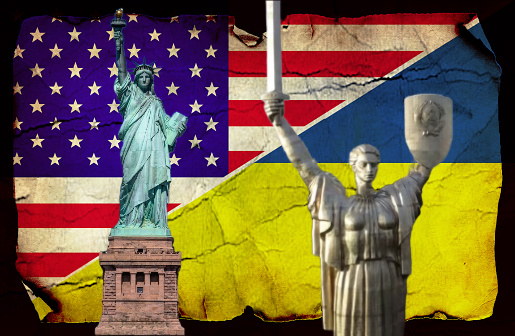
Glory to the Heroes Blog
Whatever Happened to the Ghost of Kyiv? (Part 5) Moonfish and the Legacy of the Ukrainian Viper Pilot
Lt. Col Olemski Mes in California before flying the F-15
While writing the legend of the Ghost of Kyiv, I had to imagine how a single Mig-29 would have any chance of taking down more advanced fighters with only semi-active radar missiles and a radar with a worse detection range than a disabled bat with no sonar ability. My solution was to pretend the Ukrainians had some sort of primitive datalink which could be programmed onto an iPad or some cheap device. If you are not familiar with a datalink, think of a sort of encrypted internet for the sky, with agreed upon symbols to track the location of both friendly and enemy aircraft.
The United States Military uses a datalink called LINK-16 (Often called JTIDS in some circles). For the longest time, the Navy was the oddball, using a much older datalink called LINK 11. Nowadays the Navy uses LINK 22 – a more secure link designed for maritime operations. I digress. Why am I giving an info-dump on tactical data links when this is supposed to be the final entry of my Ghost of Kyiv series?
Ukraine has command and control deconfliction issues. In the first few days of the war, one of the nation’s best pilots Oleksandr “Grey Wolf” Oksanchenko was shot down in his SU-27 over Kyiv by friendly fire. Therefore, explaining this problem to someone in the Ukrainian Air Force would be like telling them water is wet. Yet you, my meager audience of readers, need to understand the challenges of integrating an Air Force with Soviet and NATO technology, and then trying to fight a war at less than 2000 feet with fighter aircraft. It might have cost one Ukraine’s best pilots his life. If Ukraine had Link 16, Oleksiy Mes might still be with us.
Lilia Averyanova accepts a flag in memoriam of her son Andrii
I would like to help you get to know Moonfish a little better like I did for Juice and Major Tarabalka, but there isn’t a lot out there on this fine young pilot unless you pair him with Juice. I hope to change this with an interaction with a new source someday soon. I would like to tell you how he got his callsign, but asking a pilot that question is a bit like asking a woman her age. You just don’t do it. What I can tell you is that Moonfish loved to fly like all the others, and that he had reached the rank of Lt. Colonel at only the age of 30. He grew up in Shepetivka, Ukraine. This town is West of Kyiv, and has a rich history. In addition to the usual nations trying to claim ownership of Ukraine, this area has also periodically been part of Poland. And then while in school the young Oleksiy Mes became fast friends with one Andrii Pishchykov. That’s right. Juice and Moonfish were brothers and wingmen from the very start.
Because they were so close, a few tidbits about Moonfish actually come from Andrii’s mother, Lilia Averyanova. She describes Oleksiy as the responsible eldest sibling of a large family, and the hard working grandson of a beekeeper. The “salt of the earth”.
When Juice went down in training, Moonfish never had time to manage his grief. In addition to flying and fighting in the first few days of the war, they had been successful ambassadors for bringing the F-16 to Ukraine. They had faced politicians wary of Putin’s nuclear threats and the growing distrust of a public being fed misinformation and Russian propaganda. The day before Moonfish took off an did not return, he sent a letter to his dear friend’s mother, writing:
"I was very lucky to be friends with Andriy. It is hard to remember this day, a year ago we all lost a lot. I hope he is looking at us and is proud of what we are doing. I hope we are not letting him down. I still miss having him around to talk to and get advice. May he rest in peace. Our sincere condolences." (Ivanytska, 2024)
While Juice would never get to drive the Viper, Moonfish had the privilege of becoming one of the first. He completed the training in a little under six months. Because of his crash, some criticize the training for being too fast, but pilots from the Ukraine and the California national guard could attest to his skill.
Lilia, Juice’s mother, sits in the aircraft her son never got to fly for Ukraine.
We should dismiss hostile fire immediately. If Russia had known a Viper had gone down, they would have claimed immediate victory. However, Russian propaganda channels were silent until several days later when controversy erupted. Some Russian media eventually claimed an S-400 guided by an SA-21 Weapons system made the kill, and I have encountered that argument online in a few different fighter pilot blogs. Keep in mind cruise missiles skim the surface at 500 feet or less, and would have been headed toward Ukrainian targets. Moonfish and his wingman would have been chasing at low altitude headed away from Russian radars most of the time. It is possible, but unlikely, that an SA-21 could have targeted Moonfish while he was searching for targets, but his awareness would have been very high in that situation.
While the Ukrainian Air Force was still investigating the cause of the crash, a member of the Ukrainian Parliament, Maryana Bezuhla, made the following post on Telegram. (Ukrainians tend to use telegram as one of their primary social media sources).
“According to my information, the F-16 piloted by Aleksey ‘Moonfish’ Mes was hit by a Patriot anti-aircraft missile system due to discoordination between units.” (Durden, 2024)
Maryana Bezuhla is a member of Ukraine’s Permanent Delegation to the NATO Parliamentary Assembly, and headed the "Reform of the Armed Forces medical supply system" program in the Ministry of Defense. From a very limited amount of research on Wikipedia, she seems to have built her career in the Verkhovna Rada (Parliament) around reforming the military and its relationship with the people of Ukraine. Therefore, in my mind, we should take her word as sincere and informed but also coming from a place of general distrust for the military. As I have pointed out earlier in this blog, in Ukraine the military still has quite a bit of Soviet doctrine in place, to the point not even the pilots were willing to remain in the Air Force until their very families were threatened by Russia.
Of course, Russian media pounced on the news implied by her telegram post and triumphantly proclaimed the fratricide as fact. As a result, the commander of the Ukrainian Air Force, Lieutenant General Mykola Oleshchuk had to respond, presumably also on telegram.
“No one was hiding anything and is not hiding anything!” He wrote. “The entire top management immediately received a report on the crash. Our partners from the United States also received a preliminary report and have already joined the investigation.” (Ivanytska, 2024)
He went on to accuse Bezuhla of playing right into the hands of the Russian propaganda machine, writing “the whole of Russia applauds you.” Within hours of this response, Zelensky fired Oleshchuk from his position and replaced him with Lieutenant General Anatolii Kryvonozhko. And this is where Ukrainian politics gets tricky. Was Zelensky protecting Bezuhla, who is a member of his same political party? Or did he make the move because an F-16 had gone down and he could not afford the distrust of the military Bezuhla might cause? A few facts to consider: First, Zelensky awarded General Oleshchuk “Hero of Ukraine” for his command of the Air Force in the opening days of the invasion. Second, a month after this incident, Parliament unanimously voted to remove Maryana Bezuhla from her position of deputy chair of the National Security Committee. It seems that, unlike in the United States, there are at least some consequences in Ukraine for posting confidential or classified information on social media.
A F-16 “Viper” splashes a drone
Despite all the controversy, there is a real chance Moonfish fell victim to a patriot missile fired by his own nation. A classified investigation would reveal a timeline of all patriots fired and if any could have potentially hit Moonfish’s jet. If they could rule out a patriot based on firing logs, then they would have announced this by now to discredit Russian media. I agree with experts who hypothesize Moonfish fell victim to debris from his own destroyed target. Several Ukrainian pilots, including Karaya have had this misfortune already. Ideally, you want to shoot a cruise missile or drone from a distance above the target, but in their desperation to protect civilians, the Ukrainian aces often have no choice but to pursue co-altitude, especially with Russian SAMS hunting them. I do not have a bad example, but I do have an example of a safe shot from a Mirage 2000. Notice how the pilot makes the shot from well above. This deconflicts the debris. A cruise missile or drone is a slow target and very dangerous to engage head on.
Regardless of what brought him down, fratricide or debris, a proper nationwide command and control network with Link 16 might save the lives of pilots in the future. As of this article, a second F-16 was lost in a similar scenario – chasing cruise missiles. This time, Russia was ready to claim victory. By all accounts, we can assume Captain Pavlo Ivanov was trying to defend Sumy when he went down. A Russian SAM is out of the question, but it is possible an SU-35 might have scored a long-range look-down shoot down shot.
Despite this possibility, given the odds of running into missile or drone debris with no choice but to stay low to engage threats, I think it is clear the biggest threat to a Viper pilot in these engagements is debris and sage angle of attack.
For two years people have been hoping the F-16 would help turn the tide, but what we are seeing is not only are the numbers not favoring the Viper’s capability for Air-to-Air engagement, but its clear command and control is lacking cohesiveness. Ukraine’s meager fleet of Vipers has Link 16. But not their GCI (Grund control intercept), Not their French Mirage 2000s, and not their patriots. This is why it was such a big deal when the Trump administration cut off intelligence from Ukraine. It’s not a bargaining chip like a tariff. It costs lives. Despite this, Ukrainians have been knocking as much as 70 percent of missiles and drones out of the sky.
The Ukrainian version of the missing man salute uses two aircraft in shadow
We need to be all in on Ukraine. We could easily help them be set up with NATOS command and control structure. Ukraine has long accepted foreign warriors into their ranks. They could easily accept foreign fighter pilots, maintainers, and more volunteers to help them set up a command-and-control system which works. In order for them to do so, we would need to be prepare for Russia’s response. They would call them mercenaries. They might even call them actors. Moonfish and Juice would call them heroes, just like the RAF pilots did for the Americans who joined them during the Battle of Britain in 1940.
Victory in the air means victory for Ukraine. If we really want to prevent atrocities like Sumy its not going to be by asking Russia to play fair. We need to play unfair and send them everything we can. Moonfish didn’t blink as he shot down three cruise missiles and a drone that day, and we can’t blink when Putin rattles his nuclear saber. We all need to be Ghosts of Kyiv.
Works Cited:
1. Durden, Tyler (30 August 2024). ZeroHedge. Friendly Fire Fiasco: Ukrainian Army Shoots Down Its Own F16 Jet, Pilot Killed | Retrieved 16 April 2025.
2. Ivanytska, Oksana (31 August 2024). HRO Public. 'Lord, anything but Mes'. In memory of Moonfish, fallen F-16 pilot Retrieved 16 April 2025.
Whatever Happened to the Ghost of Kyiv? (Part 4)Karaya Karaya– The Ghost of Vinnytsia
Major Vadym Voroshylov
Unlike the other pilots I have covered as part of the Ghost of Kyiv story, Vadym Voroshylov was not of part of the 40th Tactical Aviation Brigade. He flies the Mig-29 with the 204th TAB. This will be a slight inaccuracy with my fictional account of the story, as I enjoy having him be Stepen Tarabalka’s wingman. Karaya represents the pilots in my story who live to continue the fight. He does share the distinction of having earned his nation’s highest honor along with Juice, Moonfish, and so many others. In addition, he is part of the ranks of Ukrainian fighter pilots who left the Air Force in 2021 to protest of unsafe training conditions and a bureaucracy which left pilots underpaid and unable to be with their families and loved ones.
Karaya hails from thetown of Krmenchuck, Poltova Oblast, a port city on the Dnipro River between Kyiv and Karkiv. He graduated from Kremenchuk Military Lyceum, the military academy closest to his home, in 2015. Like Juice, Vadym also then attended military training at the Ivan Kozhedub National University of the Air Force and graduated with honors in 2016 where his Master’s degree in aviation management earned him a slot in the 204th.
One of the catalysts for Vadym, Juice, and other quitting the air force in protest was the crash of Antonov An‑26 aircraft near the airfield of Chuhuiv, killing 26 people on board. The safety report blamed the pilot, but Vadym and his comrades were not buying it. Since most of the souls lost were young cadets, it was the last straw. The Kyiv post covered the story and made Vadym their primary interview as one of the most promising young pilots in the Air Force to resign. (Ponomarenko, 2021).
It is safe to assume that Juice, Moonfish, and Karaya would have all stayed in the Air Force if they thought Russia would invade within a year. It is a testament to the insanity of the invasion, and how a slightly divided Ukraine wrecked by a silent invasion of Russian mercenaries would soon be unified against a threat becoming very real. On 24 February 2022 they all scrambled in the dead of night to make sure their families were safe and then get back to a jet as soon as possible. I am not able to confirm when Karaya was able to take to the sky again, but he flew twenty combat missions between the start of the war and 12 October 2022. (Barsukova, 2022)
Karaya and his wingman patrol the skies over Ukraine.
On the morning of October 12, 2022 Vadym shot down three Shahed drones. In the evening, he went hunting for more. He shot down one Turkish drone without incident. The debris of a second drone proved fatal to the aircraft. Many pilots would have ejected right away, but Vadym knew he was over residential areas. He flew the aircraft for as long as he could before he spotted a “patch of black” and ejected. After escaping the flames, Karaya took a short film of his bloodied face and decent and posted the event to Instagram to let his comrades know he was alright. It has now become something of a famous photo, at least in Ukraine. (Barsukova, 2022)
Karaya letting everyone know he’s just fine.
A young couple took the injured pilot into their home and kept him safe until he could be recovered and transported to a hospital. For his efforts in protecting civilians, and for becoming an ace in one day, Karaya was awarded the Order of the Gold Star. He also earned the title, “The Ghost of Vinnystia” from the people of the town he protected.
At this point I can happily write that Karaya’s fight continues. He is something of a minor celebrity in Ukriane, along with Roman Krybov (the man who told the Russian Warship to go F-itself.). He even starred in a commercial recently for several Ukrainian companies who were working together to send care packages to make sure every Ukrainian warrior gets a care package monthly that they can order through a phone app, and several items are paid for or discounted for them. Karaya is shown getting gas and coffee paid for so he doesn’t have these financial worries during the war.
I’m sure Karaya was glad to help promote the government application, but he is much more excited to be flying the F-16. In 2023 Vadym was featured in an Euromaiden Press article advocating for the F-16 like his predecessors Juice and Moonfish. (Sheridan, 2023). With many interviews like this he is making the case over and over about how with enough modern fighters Ukrainians will own the sky.
Karaya with Colonel Volodymyr Logachov - Former Pilot and Commander of the Ukraine Aviation Department (which likely oversees training, I need to confirm).
Yet social media continues to be one of his best assets. His Instagram indicates that while the 40th TAB might have been the first to fly operational Vipers, the 204th is now training on them and preparing to go operational. He wanted to show his gratitude for the aircraft after Zelensky was accused of not being thankful enough in the notorious meeting and made a special video. I know all of this because he regularly updates the same Instagram account from which he posted his famous photo.
Vadym Voroshylov (@___karaya___) • Instagram photos and videos
Karaya continues to carry the torch of the Ghost of Kyiv, and I pray his experience keep him and the other Ukrainian pilots safe. But they will need our help. Call your congressman and tell them to defy the direction the Trump administration is going. America cannot afford to sit on the sidelines of this conflict. We talk a lot about money being spent, but not equipment. Karaya needs jets and patriot SAM systems with proper Link-16 to prevent frat and shoot down even more cruise missiles. More than that, they need the command and control and the numbers to finally drive the Russian Air Force from the skies. Karaya and the Ghosts have them running scared, but if we remember who we are as Americans and really contribute what Ukraine needs once and for all (not piecemeal), the invaders would fly home and never return.
(The following video is in Ukrainian, but you can set closed captions to English)
У Вінниці пілот «Karaya» розповів, як врятувався з палаючого літака - YouTube
Works Cited:
Barsukova, Olena (10 December 2022). Ukrainska Pravda. Hero and "Ghost of Vinnytsia": what is known about pilot with call sign Karaya Retrieved 7 April 2025.
Ponomarenko, Illia (31 July 2021). Kyiv Post. Jet pilots leave Ukraine’s Air Force en masse, threatening security Retrieved 7 April 2025.
Sheridan, Danielle (2 April 2023). The Telegraph. Russians setting traps to take out Ukrainian fighter jets Retrieved 7 April 2025.
Whatever Happened to the Ghost of Kyiv? (Part 3) Stepan Tarabalka - The Face of the Legend
Stepan Tarabalka in Pilot Training
I have learned the least about Stepan Tarabalka’s military exploits compared to all the other heroes of the 40th TAB. This could change if I find a contact who knew him, but for now not much is known about the young pilot in terms of the media—right wing, left wing, Russian, Ukrainian, he is forever the man journalists thought might be the “Ghost of Kyiv”. This is because his helmet and gloves went on auction in the UK to support the war effort. For a little while, he was credited with 40 kills. Media skeptical of the myth of the ghost immediately (and correctly) scoffed at such a high number. However, most media outlets never seemed to calculate cruise missiles or drones into their kill counts for the Ghost, because the myth was about a romantic notion of air-to-air and pilot-to-pilot victories. I always assumed cruise missiles and drones were part of the story from the start. And, in fact, they are important victory count for every Ukrainian ace. They are part of a new type of war. Drone on drone dogfights are now a regular engagement.
We cannot confirm much about Tarabalka as a pilot. We don’t even know his call sign. We do know the date and area of when he was shot down and did not return, and we are told it was a dangerous and risky mission from the get-go. This might account for the continued secrecy regarding his fate. I hate to think his death to be yet another fratricide, but it is possible considering the Ukrainian Air Force would rather have not been forced to admit that the Grey Wolf and Moonfish were also victims of friendly fire. Those admissions only came on the heels of some savvy journalism.
And yet, someone wanted Stepan’s memory honored enough to call him the ghost. Someone thought him worthy enough to donate his personal effects to auction with the title. And it worked, at least until the 40 kills exaggeration forced the Ukrainian Air Force to declare the Ghost a myth. However, because of his time carrying the moniker of the Ghost, we know a bit more about Tarabalka’s family and personal life at this point in 2025 than many of the brave Ukrainian pilots who will never return from the sky. In this regard we can imagine his family as a sort of look into the family life of every pilot who battles in the skies over Ukraine.
Stepan Tarabalka was born in the small village of Korolivka near Kolomyia in the Ivano-Frankivsk Oblast. Kolomyia has an Air base, and here the young Stepan would be inspired to become a pilot. For a kid from a working-class family, like Stepan, becoming a pilot was a dream that was probably out of reach. It would be like a middle school kid wanting to become an NFL football player. When Stepan was young, pilots still came from Soviet aristocratic families. In later years, Natalia and Ivan spent a lot of time working in Portugal, where they could earn a lot more money than at home in Ukraine. And yet Stepan reached his goals, with his effort and the prayers of his mother.
Stepan’s Parents
Stepan’s mother also revealed in her interview with Eric Westervelt of NPR on 25 March, 2022, that after Stepan completed flight training he would often buzz the small villages of his hometown with a Mig-29 flyby and a wing-rock salute. (Westevelt, 2022) This interview can still be listened to at the link in my works cited. . Maybe his callsign was “trumpet” or “fanfare”. Maybe it was something in Ukrainian that doesn’t translate. In my noveliztion of the Ghost of Kyiv, I call him “Deviant” because I imagine he had to break protocol or flight restrictions to fly over the villages, even if he was scheduled for transitions at Kolomia Air base. After all, he was known for putting on a little air show.
Cadet Stepan Tarabalka
It wasn’t long after completing a pilot training that Stepan found himself flying in a war, conducting bombing missions against Putin’s quite mercenary invasion of the Donbas. I like to think he went to war with a callsign that reminded people how he grew up with a love of music, and could play the trumpet. He served with the 40th TAB during the war years Americans tend to know far too little about. So, whatever the mission was that he did not survive, it no doubt required the expertise of a veteran to fly low and hug the terrain. In those early days of the war, Russian surface to air threats were everywhere inside Ukraine.
Stepan was shot down over the Zhytomyr Oblast. During the first weeks of March, the Zhytomyr highway became one of many notorious “Highways of Death” where Russian troops (or orcs as the Ukranians call them) deliberately targeted civilians. They had already killed dozens. On 13 March, as Stepan took to the air, a local police officer named Andriy Ziniak was shot in the back and killed. (Martyniuk, 2023). I imagine Stepan was asked to be the point distraction fighter so SU-25s could attack Russian armor along the highway, or perhaps attack the large 40 mile traffic jam of Russian military vehicles headed for Kyiv. He is said to have been outnumbered in a dogfight, which was always the case in those days. Its not hard to imagine yet another nobel sacrifice so more of his brothers could live, as Stepan was awarded the order of the gold star. He was laid to rest in a closed casket funeral. He is survived by his sister, Julia, his wife Olena, and a son who would now be eleven named Yarik.
I like to think one day Yarik will take to the sky like his father. Only in a brand new F-35 over the skies of a free Ukraine, flying wingtip formation with a Ghost of Kyiv.
Stepan and Wife Olena
Works Cited
Westervelt, Eric (25 March 2022). One Ukrainian family grieves the loss of their fighter pilot son. NPR. Retrieved 31 March 2025.
Martniuk, Yevheniia (10 April 2023. Ukraine’s death highway: How Russian troops executed dozens of civilians near Kyiv. Euromaiden. Retrieved 31 March 2025.
Whatever Happened to the Ghost of Kyiv? (Part 2)The Ballad of the Vyacheslavs (Yerko and Rodionov)
A “Ghost” prepares to fly a Mirage 2000. Note the Paint Job.
When I began this Ukraine blog, I mentioned three pilots as critical to the story of the Ghost of Kyiv. Research has shown me there are so many more than three. When I completed my novella on the Ghost a year and a half ago, much of the information I have now did not exist. Each year, more information will come. By the time Ukraine has finally won this conflict, I hope Americans are the ones who express the gratitude that has been missing. Make no mistake, this conflict with Russia is as much our war as Ukraine’s. Never before has a battle been fought on such a scale by someone else on behalf of the people of the United States. When the war started on 24 February, 2024, I think everyone intuitively knew this. At this point, we have a lot of casualties to both Russian propaganda, and right wing media propaganda which creates a disillusionment of the place of leadership the Untied States has in the world.
I want to take people back to that first day of the war. Russia attempted an unprovoked surprise attack. They built up their forces claiming a training exercise. To be clear, nobody bought that excuse, but most intelligence agency talk was that this was all political posturing so that Putin could make certain demands and then withdrawal. Therefore, it was somewhat of a surprise for pilots like Lt. Col. Vyacheslav Yerko and others that they needed to scramble for their jets and retrograde to reserve bases scattered around west Ukraine.
The Russians target each Ukrainian Airbase with 30 missiles, for a total of 155. Vasylkiv Airbase sits about 40 km south of Kyiv, and its here the story of the Ghost truly begins—not with victory, but with sacrifice. In that initial attack, most aircraft that took off were unarmed. The Russian pilots had no way of knowing this, but if they discovered the retrograding aircraft had no teeth, the Ukrainians might be hunted down. 25-year-old fighter pilot Vyacheslav Rodionov covered his brothers from the air. He took off in his plane and diverted the enemy’s attention by heading for them in an attack azimuth while his squadron mates dispersed. The act cost him his life, and he was posthumously awarded the Order of the Gold Star (Ukrainian Medal of Honor). The 40th Tactical Aviation Brigade credit him with saving the entire brigade. (Rop, June 2023)
Vyacheslav Rodionov
Once the brigade refueled at their reserve bases and rearmed, they reentered the fray against the Russians. The pilots of the Russian Air Force had been told they already had air superiority, so when they encountered resistance, they fled. As an entire wave of Russian Aircraft retreated north to Belarus, it gave “Juice” Pilshchykov the idea to prey further on the fears of Russian pilots, and concoct the story of the Ghost of Kyiv. (See Part One Here: Andrii Pilshchykov - The Original Ghost. (Part 1) — Travis Hightower ).
Even though Juice wanted to use a legend as a weapon against the Russians, the story of an ace Ukrainian pilot taking down several advanced aircraft had a kernel of truth to it. Despite the social media debate over the meme, Russian pilots knew that Ukrainian Migs had terrorized their forces over Hostemel Airport just 25 kilometers north of Vasylkiv Air Base.
After the initial missile strikes, Russia sent a 700-man force riding in 24 Mil Mi-8 transport helicopters escorted by 10 attack helicopters. (A mixture of Mi-24 and Kamov Ka-52 gunships.) With the Russian escort fighters in retreat in the face of unexpected resistance, five Mig-29s of the 40th Tactical Aviation Brigade sliced through the formation and shot down 4 of the 34 helicopters. Lt. Colonel Yerko is credited with two of the confirmed Mi-24 kills.
Over the next 24 hours, a fierce battle raged in the sky. The Russian fighter pilots accepted they still had an enemy to fight, and the scrappy Ukrainians managed to close distance and engaged them at close range. They needed to nullify the long-range advantage of the Russian active radar missiles, and for the most part succeeded in making it to the merge with the Russians. The “Merge” is when long beyond-visual-range missile shots are no longer an option, and a more traditional turning dogfight popularized by Hollywood movies begins.
The only problem—the Ukrainians pilots are usually outnumbered by at least five to one in these engagements, and the Mig-29 does not hold much gas. This meant a tight rotation of two Ukrainian fighters against up to twenty Russians at a time, with most engagements ending in a Ukrainian retreat until the next pilots could join the fray.
In this savage environment, Yerko and the pilots of the 40th prevented any more reinforcements or aid from reaching the Hostemel Airport, and the Russians were forced to retreat. They had lost their quick-deploy field for laying siege to Kyiv, and would have to do it the hard way. And we all know how well that went. Yerko downed an SU-25 attack aircraft trying to provide close air support to Russian troops, and then the Russians finally outflanked him. It is unclear what type of fighters brought him down, but several sources report he was able to eject safely. Despite this, the Russians shot him in his parachute on the way down, most likely coming from ground fire at the airport. (Axe, December 2022)
The Ukrainian Air Force also credits Yerko with downing an SU-35. Since this kill is unconfirmed, I think it is a good bet Yerko was in a two versus one with SU-35s. At close range, he may have been able to pull it off, but it is also just as likely a Ukrainian SAM managed the SU-35 kill. Still, its clear Yerkos experience made him an ace, even if his true numbers did not.
I don’t have much on Yerko for a biography beyond this ballad, but he leaves behind a wife and two daughters and is yet another recipient of the honor “Hero Of Ukraine”. More importantly, he and Vyacheslav Rodionov are part of the true legacy of the Ghost of Kyiv and freedom for us all.
Lt. Col. Vyacheslav Yerko
Works Cited
Rop, Natalia (21 June 2023). The story of several dozen pilots who protected the skies of the capital in the first days of the full-scale war - NV reconstruction. The New Voice of Ukraine, Retrieved 24 March 2025.
Axe, David (9 December 2022) . Five Brave Ukrainian MiG Pilots Blunted the Russian Attack On Kyiv On Day One Of The War. Not All Of Them Survived. Forbes. Retrieved 24 March 2025.
Aviation Safety Network Archive of References Submitted by Users, Retrieved 24 March 2025
Andrii Pilshchykov - The Original Ghost. (Part 3) Bringing the Viper to the War
Zelensky Thanks the United States in a very grateful way for their F-16s.
"If you cannot shut the sky now, then give a timeline when you will do it. If you cannot provide a timeline, tell us how many people have to die? Tell me how many. I'll go to count and wait for the moment. I hope the sky will be shut down. If you don't have strength and courage to do that, then give me the planes.” ~Volodymyr Zelensky 3 March 2022 (Basu, 2022)
When Zelensky asked for us to close the sky, we could have. It would have meant calling an incredible bluff. It would have looked foolhardy to anyone who didn’t know better, and its hard to be transparent enough without giving away classified information as to why we could ignore Putin’s nuclear saber rattling. In truth starting a no-fly zone would have placed the ball in the Russian’s court. If they were to engage us as we patrolled the sky, the war to follow would be their fault. The same situation occurred during the Cuban missile crisis with ships, only we were much closer to home.
When the Russians gave up their attack on Kyiv, the United States and NATO had another opportunity to close the sky, in the interest of protecting Ukrainian civilians. But our approach was conservative. So, what about giving Ukraine the planes? This seems like a reasonable request considering From September 28, 2022, to September 1, 2024, Russia launched a total of 11,466 missiles. On average, 23.2 missiles were launched daily at mostly civilian targets and infrastructure. As it turns out, western Republics were squeamish on getting Ukraine the aircraft they would need to turn the tide.
Juice and his wingman Olenskii “Moonfish” Mes would be instrumental in giving the United States and NATO the courage to move forward with arming the Ukrainian Air Force with the HARM Missile, the F-16, and the Mirage 2000. It all started with the two pilots taking a trip to the United States in June, 2022.
I’m trying to learn the circumstances of how their invitation came about. I suspect members of the 144th fighter wing of the California National guard might have had something to do with it. Whatever the case may be, Juice and Moonfish made their way to Washington DC and met with Senator Lindsey Grahm, Congressman Adam Kinzinger, and many others.
Before the visit, Grahm remarked that getting F-16s to Ukraine would be a “tough sell”. Juice and Moonfish were introduced in a session of congress. Kinzinger also introduced a bill called the “Ukrainian Fighter Pilots Act.” Their role was to convince the lawmakers that Ukrainian pilots could quickly train on and master the F-16. These were two pilots who had already flown exercise missions on the F-15. By the time they had finished their rounds in congress and completed several interviews with major American news networks, there were few who still doubted the pilots. The Bill passed, and all that remained was to convince the Biden Administration. Would the F-16 enter the fray soon enough to turn the tide in the air?
“I believe that more than any other person out there, “Juice” is responsible for the F-16s coming to Ukraine. He did countless, tireless interviews with western media, pleading for modern jets, and when that wasn’t enough, he traveled across the ocean to look the American Senators in the eyes and to tell them that Ukrainian pilots can fly anything. And the Senators believed. Now, the jets are coming and when the first F-16 crosses the Ukrainian sky, Juice will be there,” said Adam Makos, an American writer and military historian.
As effective as this first trip was, it took another year before a plan went in motion to get Ukraine the F-16. On 11 July 2023, an international coalition of eleven European nations was formed during the NATO Vilnius summit to train pilots, technicians, and maintenance support for the F-16. Greece joined the coalition a month later on 22 August. Almost reluctantly, the United States finally joined on 24 August.
By 2023 Russian propaganda was rampant in the US. Tucker Carlson left Fox news in April of 2023 and by July 2023 Twitter had become X, catering to misinformation more than ever before. In August 2023, the same month the F-16 was finally under commitment from the United States, Tucker Carlson interviewed the authoritarian prime minister of Hungary, Viktor Orban. And my family listened. Not only did they listen, they called me “one sided” for not wanting to listen to a smart version of Trump and a Propogandist. And so . . . I forced myself to watch the interview. There were forces hard at work to slowly drill into the mind of the average US citizen that the war was Ukraine’s fault. What hurt is that people trusted this farce of an interview over someone like me, who lived bathed in the truth of the matter both on a classified and unclassified level. As a result, I understand what a huge victory it was for Ukraine to get the “Viper”.
Tragedy struck before Andrii Pilshchykov would ever see the fruits of his hard ambassador work. As mentioned in part 1, Juice and two other pilots (Major Viacheslav Minka and Major Serhii Prokazin ) when their two L-39M1 trainer planes died in a mid-ai collision during dogfight training with L-39M1 aircraft on the evening of 25 August 2023. Zelensky offered remarks the next day. It would be a almost a full year before Ukraine would get their first F-16s.
After his long-time dear friend and wingman was laid to rest, Moonfish had this to say as he took up the mantle of leader for advocacy of the F-16.
"Andriy was the 'ideas man' and the main driving force behind it all. And I feel responsible to him for ensuring these planes arrive." (Tatasova-Markina and Kottasova, August 2024)
At long last, on 5 August 2024, the first Ukrainian F-16s went operational. Six of them. On 26 August, Russia launched its most massive missile and drone attack yet. The F-16s moved to intercept, helping to shoot down 102 of 127 missiles and 99 of 109 drones. The Vipers most likely closed on their targets and used the AIM-9 Sidewinder to take down the aging cruise missiles and fat Turkish drones, saving their stockpile of AIM-120B AAMRAM Radar Missiles for more difficult fights to come against the Russian Air Force.
Two Days later, Russia fired again. This time, Moonfish was sent to chase down the enemy, and did not return. His aircraft crashed after taking down three missiles and a drone. This brought his total kills in the F-16 to 7 missiles and a drone. Another ace pilot, and another hero, was gone.
For now, Ukraine needs to be cautious with less than a dozen F-16s. They were supposed to have around 30 to 35 by now, But Belgium delayed its delivery because the United States Delayed the delivery of F-35s we sold to the country. That’s the official story. Unofficially, the United States cannot be trusted to hold up its side of the bargain on any arms deal, especially to a European NATO country. And that is the fight we need to win here at home, for ourselves as much as Ukraine.
Until then, Juice and Moonfish will be waiting, patrolling the skies over Ukraine as Ghosts of Kyiv.
Works Cited
Basu, Zachary (3 March 2022). "Zelensky: If West won't impose no-fly zone, "give me the planes"". Axios. Archived from the original on 10 March 2022. Retrieved 8 March 2022.
B., Volodymyr. "Born for the sky: Andrii "Juice" Pilshchykov obituary". Militarnyi. Retrieved 29 August 2023.
Daria Tarasova-Markina and Ivana Kottasová (29 August 2024) Ukraine says US-made F-16 fighter jet crashed, killing a Top Pilot, ABC Eyewitness News Retrieved 18 March 2025/
Andrii Pilshchykov - The Original Ghost. (Part 2)
The Unprovoked Russian Invasion, 24 February 2022 – 5:30am
It starts out as a dream. A distant whistle. A rolling thunder. Andrii is caught in a storm, but he stands in the eye of a hurricane. Jets and missiles whirl around him until, BOOM! His entire apartment shudders. The sound of the howling wind is actually an air raid siren. His base is under attack! Vasylkiv Air Base is 20 miles southwest of Kyiv. Missiles landing here could only mean one thing—Russia had launched a full-scale invasion.
On his way out of the Air Force, he had agreed to rally the wives of those who would be taking to the air soon in a mad scramble to protect the nation. Some would never return. We will tell all their stories in future entries, reader. One of the wives contacted was almost certainly Elena Tarabalka. After an emotional exchange with several wives, Andrii grabbed his military issue rifle and headed for base. He desperately, wanted to get into the air, but the Ukrainian Airforce was executing a retrograde plan which would see several pilots engage the Russians without weapons to buy the rest of the force time. Andrii explains his role in those first days.
“Actually, for the first few days, there were no cockpits for me, we had no free jets for me on the base, because they were on another airfield,” he explained. “So, my mission was to provide ground defense for my squadron, with some special [operations forces] guys, to help them, because I know this place better than they do.” (Newdick, 2022)
The first days of fighting were ferocious, especially in the battle for Hostomel Airfield as airborne Russian troops tried to seize the strategic location. With the members of the 40th Tactical Aviation brigade claiming kills against two Il-76 transports used to deliver airborne troops, four Mi-24 helicopters, A SU-25 ground attack aircraft, and possibly even one fancy new SU-35. (No visual confirmation of the latter). The Ukrainian Air Force credits an ace pilot named Lt. Col. Vyacheslav Yerko for two of the helicopters and the two [fixed wing aircraft. Yerko was shot down over the airfield. Ukrainian sources report the Russians shot him as his parachute floated down. The media has to be objective about this, as it is hearsay. I am careful when kill counts for the Ukrainian side seem high, and I wonder if one pilot managed four kills on the 24th. But if the Ukraine military tells me a pilot was executed after ejecting, based on the track record of the Russians in this war, I believe them. (Axe, 2022)
The exploits of Lt. Col Yerko, also make me wonder if this is who Juice was referring to when asked about the “Ghost of Kyiv.”
“There are a lot of versions (Of the Ghost of Kyiv) now on the internet,” he admitted, “but the first stuff [reported] about him is actually the truth. Of course, some fiction has since been added. But actually, he’s from my home base, my unit … I couldn’t tell you all the details now, but I think after the victory you will know everything about him.” (Newdick, 2022)
Perhaps Yerko’s victories made Juice feel more than justified in starting his own propaganda campaign. However the legend would travel from Yerko to other pilots. Five weeks into the conflict, and two more pilots of the 40th Tactical Aviation Brigade had gone down. One of these was Major Stepan Tarabalka. Ukraine was able to recover his helmet and flight gloves, and when these items were labeled as belonging to the “Ghost of Kyiv” at an auction supporting the war effort in the UK, international media ran full sprint with the story. The Legend became so bloated that the Ghost (Tarabalka at the time) now had more than forty kills. It was at this point the Ukrainian Defense page was forced to declare the Ghost a “Super hero Legend.”
Meanwhile the war raged on. The Mig-29s of the 40th provided top cover as Ukrainian SU-25 attack aircraft tried to harass the Russian lines – in particular that long traffic jam outside of Kyiv. It was here that the Air war became “Cat and mouse” with neither side really wanting to risk a full on missile engagement without the advantage. Juice describes the patrols.
“I am patrolling in the area and trying to find something, ‘free hunting,’ or sometimes it’s like pushing the enemy from your area. If they have us on their screen, especially if we have a few guys patrolling the area, they don’t want to get into trouble. So, we can push them from the area.
Once Russia gave up on its assault on Kyiv in late March, the 40th turned the attention of its Migs to downing the larger, higher flying Turkish drones. They had tried attacking drones and cruise missiles before, with limited success, but it soon became the primary mission.
The exact kill count for Juice against drones is unlisted, but he flew over 100 combat flights, with amny of them being air to ground missions against Russian command posts. Notably, he and his wingman Vladyslav “Nomad” Savieliev were the first to fire and destroy Russian Surface to Air Missile Radar with the HARM missile attached to their Migs on 2 June 2023.
As a Ghost, Andrii Pilshchykov was lethal. But as an Ambassador advocating for the F-16, he and fellow pilot Oleksii “Moonfish” Mes accomplished an even more important mission.
A mission, now put in jeopardy, by Donald Trump. We tell the story of Juice, Moonfish, and the Ukrainian F-16 in the next entry.
Works Cited:
Newdick Thomas., Ukrainian MiG-29 Pilot’s Front-Line Account Of The Air War Against Russia, TWZ, 2 April 2022
Axe David, Five Brave Ukrainian MiG Pilots Blunted the Russian Attack On Kyiv On Day One Of The War. Not All Of Them Survived, Forbes, 9 December 2022
Andrii Pilshchykov - The Original Ghost. (Part 1)
The Ghost of Kyiv was the brainchild of Andrii Pilshchykov. He was the first to push for the legend to be spread after an engagement with the Russian Air Force in the first week of the unprovoked invasion. The engagement was like many at the time, with only four Ukrainian aircraft flying head-to-head with twelve to twenty Russian Aircraft. As soon as the Ukrainians fired their first missile, the Russian Aircraft turned and fled. Andrii would later explain this phenomenon to his mentor and pilot trainer “Stalker” from the civil air patrol.
“[They away run away] because it’s all Russian bravado: they are used to flying and bombing Syria, where there is no opposition to them.”(Militarnyi, August 2023).
Not only were the Russian fighter pilots cowards to Pilshchykov, but their Air Force did nothing but lie. After the first few hours of the war, the Russia Military declared air supremacy, which implied the complete destruction of the Ukrainian Air Force. Not only was this not true, but Ukraine was managing to hold the sky in many cases and deny Russian attacks. The Ghost of Kyiv was a way of letting the world know the Ukrainian Air Force was still in the fight, and that the Russian military had lied. “Stalker” recounted what Andrii told him about the Ukrainian Military’s decision to move forward with the Ghost of Kyiv propaganda campaign. (Stalker’s full name is protected in August 2023 obituary I am referencing).
“The commanders approved the idea of trolling the Russians, who said they had destroyed all [Ukrainian] aviation on the first day of the war. And Andrii, who had such a caustic trolling style, said: “And here we are on the very planes that they destroyed, which are not there – we are fighting them so much. And who are we? Ghosts!” (Militarnyi, August 2023).
Some of my reader may be familiar with the photo below. At the time, the pilot was a mysterious figure. The former president of Ukraine, Petro Poroshenko shared this photo as the “Ghost of Kyiv”. At one time, it was even incorrectly labeled as Stepan Tarabalka. The photo is actually of Major Pilshchykov in 2019 wearing a French helmet.
Andrii “Juice” Pilshchykov became the famous face of the “Ghost of Kyiv”
You read correctly. Sadly, these quotes are referenced from an obituary. “Juice” was killed during a mid-air collision in August 2023 while trying to train new Ukrainian fighter pilots in low-level dog fight training in the airspace near Sinhury, Ukraine. Fighter pilot training is already dangerous, but trying to accomplish it during a war increases the risk. However, the story of Andrii Pilshchykov does not end here.
“Juice”
Andrii Pilshchykov was born 3 February 1993 in the city of Kharkiv, Ukraine. He grew up infatuated with aviation, and when he was a teenager, ran a blog where he would traveled round the Kharkiv region taking pictures of any aircraft he could find. He entered the civil air patrol and first learned to fly on a Kh-32-912 Bekas aircraft with a pilot from the Civil Air Patrol NGO. (Presumably “Stalker”).
In order to pursue his dream of becoming a pilot, Andrii had to get corrective eye surgery, and after doing so was admitted as a student to the Ivan Kozhedub National Air Force University. His admission to the university is a product of cultural freedom. The University is named in honor of a Ukrainian and Soviet Pilot. It was one of two Soviet Air Force Academies. In those days, pilots came exclusively from aristocratic families. It was a high-class job to become a fighter pilot. It remained that way for a while after the Soviet Union crumbled, but Andrii is from a generation of pilots where every citizen had the opportunity.
While a cadet at the Academy, Andrii was able to visit Operation Clear Skies in 2011. Clear Skies is a large force exercise conducted between Ukraine, Eastern Europe, Britain, and the United States. It has a long tradition. The last such exercise was in 2018, and it is an important event in the story of the Ghost of Kyiv. In 2011, Andrii first lay eyes on an F-16, and snapped this photo for his blog. I can only imagine what he felt when he later got to sit in one in Norway in 2014. I can hear him making the jet a promise to fly one someday.
The closest thing Ukraine had to such a fine aircraft was the Mig-29, and on April 19, 2016, Andrii made his first solo flight in a “Fulcrum” (NATO Designation for the Mig-29). The winter of the same year, he graduated the academy and was assigned to the 40th Tactical Aviation Brigade at Vasilkiv Air Force Base. Here he would train and fly side by side with Stepan Tarabalka, Vadym Voroshylov, and many other skilled Mig-29 pilots.
Ukrainian Mig-29s
Life in in 40th was a constant generational struggle for these young pilots. They were being taught and trained by westerners, but the old guard still preferred Soviet Tactics, bureaucracy, and command style. It rested on their shoulders to move the Ukrainian Air Force forward as the shadow of Putin to the east grew stronger and civil war raged in the Donabas. And they did so in 2018 at Operation Clear Skies once more, this time with the 144th Fighter Wing of the California National Guard involved. A close relationship between the 144th and the members of the 40th Tactical fighter wing formed, and this relationship would become essential to training Ukrainian pilots in American Aircraft.
Andrii and several other pilots were invited after Clear Skies to travel to California and fly the F-15 Eagle. It was here Andrii was introduced to the best of American culture. As the story goes, they stopped at a pizzeria in their flight suits for lunch between flights. An American veteran paid the bill of the active-duty service members, to include the Ukrainians, thanking them for their service. Likewise, when police officers entered the establishment, the active-duty pilots covered their bill. This comradery stuck with Andrri, because military members of the old generation never treated the younger ones with that amount of gratitude in Ukraine. He resolved to emulate this kind of respect when he returned home and do everything he could to make sure his fellow warriors were treated the same way.
And then the Americans gave Andrii his callsign. The young Ukrainian pilot did not believe in drinking alcohol due to his religious faith, and whenever he would join the Americans at the bar, he would order juice. Out of respect for this, a name was born. As he returned home, the days raced on toward history and war, but Ukraine faced corruption issues. Pilots at home were training on dangerous, undermaintained equipment. The situation of neglect within the Ukrainian Air Force became so bad that many pilots began to resign in protest, or thinking of their own safety. In 2021, Andrii resigned his commission, giving a list of reasons. I used an AI program to translate the following image. Since it is a list of fragmented sentences, I turned them into more complete thoughts.
Andrii’s list of reasons for leaving the Ukrainian Air Force
1. The state has insufficient controllability and passive power of activity. This leads to the inability of Air Force Institutions to address modern realities.
2. Registration in the organization, or freedom of activity, does not correspond to life skills.
3. Insufficient maturity of the pilot killed in training during last year's exercises. The unit is responsible.
4. Poor Organization in the security system of Lviv.
5. Taking into account these acts and preventing working with allies (like Poland and Romania).
6. Insufficient modernization. Lack of joint leaders to strengthen the national plan.
7. Strengthen the permanent policy for the implementation of tasks for the implementation of NATO standards. Now and in the future.
8. Take into account and coordinate, if necessary, the insufficiency of joint leaders of forces and means.
9. Insufficient state of all types of provisions
10. Existing military labor regimes and influences due to the shortcomings of security scenarios of activity, as well as the predominance of the implementation of (unreadable).
11. Insufficient social protection of the young staff and their families.
12. Incomplete choice and low quality of education according to experienced instructors, lack of competence.
13. Inconsistency of leaders of the policy of this generation, which, having transferred the message to others, in plans for this choice for the future.
14. Wishes for more leave time (It think), not related to people's work.
Ukrainian pilots had a frustrating lack of an ability to have a proper family life, facing unsafe training conditions, and a general unwillingness to move forward. Some of this is due to old Soviet ties, but others seems to be the fear of being perceived as joining NATO. A fear which ultimately goes out the window when Russia invades you anyway. It is unknown whether the Air Force would have changed, and Andrii returned to the career he loved, but Putin would one day force his hand. We will save that story, for the next entry.
Works Cited:
Volodymyr B., Born for the sky: Andrii “Juice” Pilshchykov Obituary, Militarnyi, August 2023
Whatever Happened to the Ghost of Kyiv?
“The ghost of Kyiv is a superhero-legend, whose character was created by Ukrainians!”
~Facebook Page of the Ukrainian Air Force Command 30 April, 2022
With these words, the legend of the Ghost of Kyiv was put to rest. Social media groups and youtube comment sections were full of people sneering with triumph at any online stranger who had dared believe the legend. Even as early as April 2022, I could see the effect of Putin’s propaganda machine at work. There were people out there who didn’t want the Ghost to be true. It was not as if they thought there might be a more logical explanation. They acted as if it were some kind of liberal lie.
Already, there was talk of Ukraine inciting this war. Already, people believed most Ukrainians in the Donbas must be somehow suppressed by nazis. I ran into many of these people as I researched Ukraine and considered the story for my fictionalized account of the Ghost of Kyiv. A great deal of them could have been social media bots or paid trolls, but eventually the revised history of Putin reached a few of my family members through the likes of Tucker Carlson.
The lies ate at them until they believed them. Maybe this war was NATO’s fault. Maybe Putin had a right to be worried about his neighbors. Biden was in charge. It must be his fault. This could lead to nuclear war. Putin was crazy enough to do it. This would have never happened under Trump.
When these discussions too place, I was dismayed. It became clear to me that the myth of the Ghost wasn’t about whether a pilot in an outclassed Mig-29 had managed to shoot down six aircraft, including two highly advanced SU-35s.
The story of the Ghost of Kyiv is actually about whether or not Ukraine could defeat Russia. But the Ghost became a symbol of how to win a propaganda war. There is one fact of humanity a KGB Propaganda expert like Putin will never understand. Legends born of honor are far more powerful than lies born of fear.
The world has at least three real-life Ukrainian ace pilots of the 40th Tactical Aviation Brigade to thank for the legend of the Ghost of Kyiv. Each of them who each were awarded the Order of the Gold Star (Also referred to as the Hero of Ukraine medal). It is the Ukrainian equivalent to the medal of honor. The pilots are Major Stepan Tarabalka, Major Andrii “Juice” Pilshchykov, and Major Vadym “Karaya” Voroshylov. The Ghost of Kyiv is their story. I will be writing a piece on each pilot as a part of a four part series, so make sure you sign up for notifications so you don’t miss anything this week.



(This is Part 1 of 5 Subscribe and Return for The Next Entry Tomorrow, 9 March)
The Hard Truth of Credentials: Why Nobody Wants Conflict Fiction About Ukraine
I have written an anthology of three novellas on the warriors of Ukraine called “Glory to the Heros”. Since I am trying to get this anthology traditionally published, I won’t say much about the process, but I am not afraid to tell people it has failed to go on submission for a year. This is due to the status of the publishing industry and a hands-off approach to politics unless the author has political credentials – which I do not.
Credentials are a funny animal. I could be Neil Degrasse Tyson talking about my specific career field in physics, and there would be people who consider me a fraud. This is especially true if I tell a climate change denier about climate change, or perhaps a flat-earther why the earth isn’t flat. I am an expert. I am part of a huge scientific community of experts. But I am not trusted because tribalism has taught people not to trust me. And yet, negative publicity is still publicity, and Neil Degrasse Tyson has no shortage of listeners to his podcast or buying his books.
Tyson inherited the legacy of Carl Sagan, in a way and I doubt I will have the same mentorship path. And yet, I want to discover the secret to writing about timely events in my own style.
Education (usually a PhD) can bring you some credentials, but to cross the line into someone who can tell stories like I want to tell, it will take something much more. There would be no negative publicity. There would just be people ignoring a book about the important haze of legend uplifting both the horror and the heroism of Ukrainian warriors.
We call the genre “modern conflict fiction”. It uses the model of historical wartime fiction, but for something more recent. How recent can something be conflict fiction rather than historical? This distinction might provide an answer as to why publishing during a conflict might be so difficult. I found a few titles closest to each American War.
World War Two:
There were many propaganda related films during World War Two. And there were many that used the war as a backdrop. Many of them were spy thrillers. Some of them were about lovers on ships struck by U-boats. Many of the films were based on books of the same name, so the mod during world war two – a very unifying positive war after December 7th 1941 – was to tell lots of stories. Some of them were more nonfiction than fiction, but fiction always had its role.
1942 – Pearl harbor was a day that lived in infamy, but most of the American Public did not know a small island in the pacific with American soldiers was also attacked. “Wake Island” is a fictional dramatization of those real events. Propaganda? For sure. Conflict Fiction? Absolutely.
1943 – Guadalcanal Diary – The real first battle took place in August 1942 and war correspondent catalogued the events in a book. By November 1943 Hollywood had made a film dramatizing the diary. Films like this made an attempt to be almost totally nonfiction.
1943 – As a Texas Aggie, I must mention “We’ve Never Been Licked”. This film is famous (or perhaps notorious to Texas Aggies) because it uses Texas A&M University as a setting and features our famous Bonfire as the school is infiltrated by Japanese spies. It is hard to talk about how this type of film contributed to Japanese internment camps.
1945 - “A Walk in the Sun” is a 1945 fictional film based on the real history by the 1944 novel of the same name. The novel was serialized in liberty magazine.
Korean War (1950-1953)
The Korean War is often called the “Forgotten War” – but it was not forgotten by authors and Hollywood at the time. Some examples include:
“Retreat, Hell!” – A fictional 1952 film based on real war events of 1950.
“Korea Patrol” – a 1951 Film depicting a group of American and South Korean soldiers attempting to blow up a bridge. My brief research suggests even the events were fictional.
“Combat Squad” – a 1953 film depicting Korean War Combat.
Unlike WW2 – it does not appear as many films were based on books. This changes in the ten years that follow, in which many first hand accounts were turned into books and then into films. One example of this is the 1957 film “Battle Hymn”. One of the major sad themes about Korean War films is how many of these guys had survived World War 2 just to go fight in another war.
Vietnam War
I do get the impression this war is where things got sticky for the publishing and film industry.
1963 – “A Yank in Vietnam” with the war still new, and US involvement escalated to a full scale operation, a film about a downed pilot being rescued by a female South Vietnam Guerilla and falling in love is released. This shows a still Romanticized version of the war.
1966 – “To the Shores of Hell” – Now the attitude shifts toward rescuing the American POW, a theme which would carry well into the early 1980s. When we think of the trauma of the POW, none is as tragic for America as the many who never came home from this conflict.
1968 – “The Green Berets” is based (very loosely) on a book of the same name written is the same year as the Tet Offensive against the largest cities in South Vietnam (Also 1968). John Wayne was so concerned by the anti-war sentiment in the United States, he wanted to make this film to present the pro-military position. He requested and obtained full military cooperation and materiel from 36th President Lyndon B. Johnson and the United States Department of Defense. How about that for credibility? And then they made a mostly fictional film.
When we reach the modern era of warfare, fictional stories created during the actual war disappear. The first Gulf War is too short to do anything but documentary, and so is the second one. But they do get great fiction like Jarhead and the Hurt Locker. It almost seems like after Vietnam, it was not until about ten years after the conflict that stories and films were published.
My conclusion can only be that Vietnam made the industry afraid to tell fiction during the conflict. But it doesn’t seem to be because of bad sales or lack of available credibility.
And I think its wrong. Sometimes the best time to tell a fictional story is while it is happening, so you further protect the identities of real people involved. Perhaps we are too afraid of not getting the details right or showing bias. However, I can say the Russians are not afraid to tell complete fiction to get what they want, and people believe it. But that is a discussion for another time, and so is the way we give the story telling industry courage to take a stand.
Instead, I would like to focus on primary source books telling the truth. Incidentally, Ukraine did a film about a heroic last stand at an airfield during a cease fire in the same civil war. So, they don’t have a Vietnam to make them nervous about story telling, and they are familiar with near-time dramatization. I will blog about “The Cyborgs” soon. Here is a list of modern Ukrainian authors who need their experiences read. So be sure to check some of them out.
The Fall of Zaporizhzhia Nuclear Power Plant.
March 4th 2022
On this day in 2022 – The issue was still in doubt for Kyiv and Ukraine. The nation was in the middle of a desperate battle. Atrocities were being committed in places like Bucha, where 458 innocent civilians were massacred by the 234th Air Assault Regiment of Russia. The Putin regime, of course, denies these allegations, but if you are reading this blog and find Putin trustworthy, despite all the photo evidence available, stick around for a few weeks.
In this entry of Glory to the Hero’s the blog, we are going to focus much further south than the towns surrounding Kyiv. We are going to dive into the terrifying moments when the Russians seized the Zaporizhzhia nuclear power plant. The goal is to try to imagine being an ordinary civilian worker at the largest nuclear power plant in Europe when the shelling starts. The plan for this blog is to sometimes write fictional recreations of the small events of the individual heroes. But for now I want to share an actual interview.
When the plant was seized, it was an international incident. The Russians had their side of the story, and the Ukrainians have theirs. If you know what I do for a living, I can tell you I know the Ukrainians tell the truth on this situation, and the Russians do not. I am not a primary source, but I am adjacent to them. I wish I could prove it to you, but as the line from Top Gun goes . . . then I would have to kill you. (Or go to jail).
And yet, we have here an interview with a primary source. I would think Roman German in this interview would be easier to trust for some of you than some guy pretentiously proclaiming e knows things he can’t tell you. This Nuclear Engineer is a hero, who loved his job, but suddenly on 4 March 2022 he was forced to do it at gunpoint. It got worse from there. What strikes me is that this person stayed. He tried to tough it out. He tried to live under occupation. He loved his land and his job that much, but soon he had to think of his family and his very life. His escape could have gone badly. And I salute this hero.
I want you, my reader, to imagine working at a job you love, and suddenly you are forced at gunpoint to keep doing it, without pay . . . and to suffer torture if they don’t think you are doing it correctly. A true devastating loss of freedom isn’t about being forced to wear a mask, a seatbelt, or a helmet. It isn’t even really about the government trying to scare businesses into requiring vaccinations of their workers (an unconstitutional act which was overturned.) And it isn’t really about someone getting fired for refusing to not talk about something on social media. Its about this exact situation.
Think about this next time you see tyranny – yes, even in Trump. But also think about where Trump has placed his allegiances.
https://www.npr.org/2023/06/04/1180030838/ukraine-s-nuclear-workers



















































